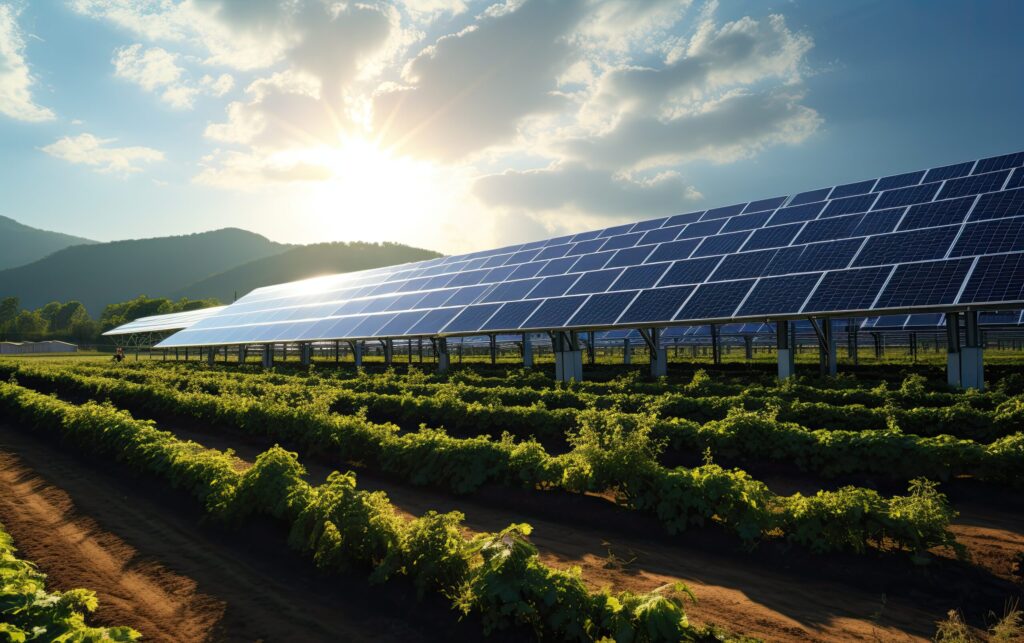Agriculture is the backbone of the global economy, yet farmers face numerous challenges, including rising energy costs, water scarcity, and unpredictable weather patterns caused by climate change. As these challenges grow, the agricultural sector is turning to solar energy to power farms sustainably and cost-effectively. Solar technology is revolutionizing farming by reducing operational costs, increasing productivity, and promoting environmental sustainability.
In this blog, we’ll explore how solar energy is transforming agriculture and how farmers are reaping its many benefits.

1. Lowering Energy Costs on the Farm
Energy is a significant expense for farmers, especially with the rising costs of electricity and diesel. Solar power offers a cost-effective alternative.
- Reduced Utility Bills: Solar systems generate electricity directly from sunlight, drastically cutting down power costs.
- Solar-Powered Irrigation: Solar water pumps eliminate the need for diesel or grid electricity, reducing fuel expenses.
- Free Energy After Payback: Once the initial investment is recovered (typically in 4-7 years), the electricity generated is virtually free for the system’s lifespan.
This cost reduction allows farmers to allocate resources to other critical aspects of their operations.
2. Solar-Powered Solutions for Irrigation
Irrigation is one of the most energy-intensive processes in farming. Solar energy provides an efficient and reliable solution.
- Solar Water Pumps: These pumps draw water from wells, rivers, or reservoirs using solar power, making irrigation accessible even in remote areas.
- Consistent Water Supply: With battery storage, farmers can maintain a steady water supply even on cloudy days or at night.
- Cost Efficiency: Solar pumps reduce dependency on expensive diesel generators, cutting operating costs significantly.
This sustainable irrigation solution is particularly beneficial for small and medium-scale farmers in water-scarce regions.
3. Supporting Sustainable Agriculture
Solar energy promotes environmentally friendly farming practices by reducing reliance on fossil fuels.
- Lower Carbon Footprint: Solar-powered farms emit no greenhouse gases, contributing to climate change mitigation.
- Water Conservation: Solar pumps paired with drip irrigation systems help optimize water usage, reducing waste.
- Eco-Friendly Branding: Sustainable farming practices attract eco-conscious consumers and improve marketability.
Farmers who adopt solar systems play a vital role in creating a greener and more sustainable future.
4. Enhancing Productivity and Crop Yields
Solar technology helps increase productivity on farms by enabling efficient resource management.
- Solar Dryers: These systems use solar energy to dry crops and prevent spoilage, ensuring higher-quality produce.
- Cooling and Storage: Solar-powered cold storage systems preserve perishable goods, reducing post-harvest losses.
- Automation: Solar energy powers advanced farming equipment and irrigation systems, streamlining operations.
By adopting solar-powered solutions, farmers can grow healthier crops and minimize losses.
5. Solar Panels and Agrivoltaics
Farmers can maximize land use by combining solar installations with crop cultivation, a practice known as agrivoltaics.
- Dual Land Use: Panels are installed above crops, providing shade while generating electricity.
- Improved Crop Growth: Partial shading from panels can protect crops from excessive heat, improving yields in hot climates.
- Additional Revenue: Farmers earn income by selling surplus solar energy to the grid through net metering programs.
Agrivoltaics demonstrates how solar energy and agriculture can coexist to mutual benefit.
6. Energy Independence for Rural Farmers
In rural areas with limited access to electricity, solar energy provides a reliable and independent power source.
- Off-Grid Solutions: Farmers can operate solar systems without relying on unstable or non-existent power grids.
- Year-Round Power: Solar systems ensure uninterrupted electricity for irrigation, lighting, and machinery.
- Improved Livelihoods: Reliable power enables farmers to diversify their activities, such as poultry farming or food processing.
Solar energy empowers rural communities to thrive and reduce their reliance on external resources.
7. Government Incentives for Solar Adoption in Agriculture
Many governments offer financial support to encourage farmers to adopt solar technology.
- Subsidies and Grants: Programs provide significant discounts on solar pump systems and installations.
- Tax Benefits: Farmers can claim tax credits for solar investments, further reducing costs.
- Low-Interest Loans: Special financing options make solar systems accessible to small-scale farmers.
These incentives make it easier for farmers to transition to solar power and enjoy its benefits.
8. Resilience Against Climate Change
Farmers are among the most vulnerable to climate change impacts, such as erratic rainfall and extreme weather. Solar energy offers a solution to these challenges.
- Adaptability: Solar systems provide consistent power, even during weather-related grid outages.
- Sustainable Practices: Solar-powered irrigation and equipment help farmers adapt to changing climate conditions.
- Future-Proofing: Solar energy reduces dependency on depleting fossil fuels, ensuring long-term viability.
By investing in solar, farmers build resilience and safeguard their livelihoods against climate risks.
Conclusion: A Brighter Future for Farmers
Solar energy is revolutionizing agriculture by reducing costs, enhancing productivity, and promoting sustainability. It provides farmers with reliable power, enabling them to overcome challenges and seize new opportunities in the face of climate change and rising energy demands.
If you’re a farmer ready to embrace solar energy, Thangam Energy Solutions Private Limited is here to support you. Our customized solar solutions for agriculture are designed to maximize your savings and productivity while promoting environmental stewardship. Contact us today to learn more about how solar energy can transform your farm!

